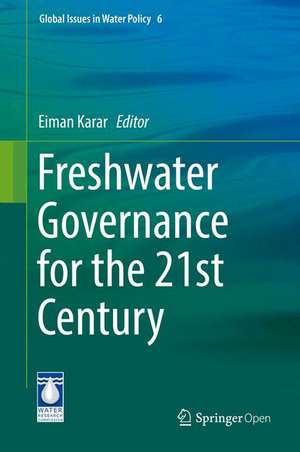Freshwater Governance for the 21st Century: Global Issues in Water Policy, cartea 6
Editat de Eiman Kararen Limba Engleză Hardback – 2 noi 2016
The book’s content is presented in an integrated and comprehensive format, building on detailed case studies from around the world and the authors’ working experiences in the water sector. Combining essential insights with accessible, non-technical language, it offers a valuable resource for academics, technicians and policy-makers alike.
| Toate formatele și edițiile | Preț | Express |
|---|---|---|
| Paperback (1) | 364.68 lei 38-44 zile | |
| Springer International Publishing – 27 iun 2018 | 364.68 lei 38-44 zile | |
| Hardback (1) | 432.12 lei 22-36 zile | |
| Springer International Publishing – 2 noi 2016 | 432.12 lei 22-36 zile |
Din seria Global Issues in Water Policy
- 18%
 Preț: 956.81 lei
Preț: 956.81 lei - 15%
 Preț: 645.96 lei
Preț: 645.96 lei - 18%
 Preț: 966.27 lei
Preț: 966.27 lei - 15%
 Preț: 649.87 lei
Preț: 649.87 lei - 24%
 Preț: 639.68 lei
Preț: 639.68 lei - 20%
 Preț: 574.08 lei
Preț: 574.08 lei - 19%
 Preț: 519.80 lei
Preț: 519.80 lei - 18%
 Preț: 786.36 lei
Preț: 786.36 lei - 15%
 Preț: 649.06 lei
Preț: 649.06 lei - 15%
 Preț: 635.15 lei
Preț: 635.15 lei -
 Preț: 395.09 lei
Preț: 395.09 lei - 18%
 Preț: 953.65 lei
Preț: 953.65 lei - 20%
 Preț: 595.16 lei
Preț: 595.16 lei - 15%
 Preț: 664.61 lei
Preț: 664.61 lei - 15%
 Preț: 643.84 lei
Preț: 643.84 lei - 24%
 Preț: 820.64 lei
Preț: 820.64 lei - 18%
 Preț: 945.14 lei
Preț: 945.14 lei - 24%
 Preț: 800.73 lei
Preț: 800.73 lei - 24%
 Preț: 685.91 lei
Preț: 685.91 lei - 19%
 Preț: 555.11 lei
Preț: 555.11 lei - 23%
 Preț: 806.95 lei
Preț: 806.95 lei - 24%
 Preț: 698.16 lei
Preț: 698.16 lei - 15%
 Preț: 635.96 lei
Preț: 635.96 lei - 18%
 Preț: 959.82 lei
Preț: 959.82 lei - 18%
 Preț: 956.03 lei
Preț: 956.03 lei - 18%
 Preț: 963.91 lei
Preț: 963.91 lei - 15%
 Preț: 642.18 lei
Preț: 642.18 lei - 18%
 Preț: 960.30 lei
Preț: 960.30 lei
Preț: 432.12 lei
Nou
Puncte Express: 648
Preț estimativ în valută:
82.68€ • 86.56$ • 68.42£
82.68€ • 86.56$ • 68.42£
Carte disponibilă
Livrare economică 17-31 martie
Preluare comenzi: 021 569.72.76
Specificații
ISBN-13: 9783319433486
ISBN-10: 3319433482
Pagini: 310
Ilustrații: XXVII, 250 p. 39 illus., 28 illus. in color.
Dimensiuni: 155 x 235 x 20 mm
Greutate: 0.67 kg
Ediția:1st ed. 2017
Editura: Springer International Publishing
Colecția Springer
Seria Global Issues in Water Policy
Locul publicării:Cham, Switzerland
ISBN-10: 3319433482
Pagini: 310
Ilustrații: XXVII, 250 p. 39 illus., 28 illus. in color.
Dimensiuni: 155 x 235 x 20 mm
Greutate: 0.67 kg
Ediția:1st ed. 2017
Editura: Springer International Publishing
Colecția Springer
Seria Global Issues in Water Policy
Locul publicării:Cham, Switzerland
Cuprins
1. Introduction and Reflections.- 2. The Establishment of Catchment Management Agencies in South Africa with Reference to the Flussgebietsgemeinschaft Elbe: Some Practical Considerations.- 3. Towards Inclusive Water Governance: OECD Evidence and Key Principles of Stakeholder Engagement in the Water Sector.- 4. Free-Market Economics and Developmental Statism as Political Paradigms: Implications for Water Governance Theory and Practice in Developing Countries.- 5. Urban Water Governance as a Function of the “Urban Hydrosocial Transition”.- 6. Urban Water Governance for the 21st Century: A Portfolio-Based Approach to Planning and Management.- 7. Rights-Based Freshwater Governance for the 21st Century: Beyond an Exclusionary Focus on Domestic Water uses.- 8. Inclusive Transboundary Water Governance.- 9. Mechanisms for Inclusive Governance.- 10. Water Integrity - from Concept to Practice.- 11. Addressing the Groundwater Governance Challenge: A Call from the “Groundwater Governance: A GlobalFramework for Action” Project.- 12. Water Governance Futures in South Asia and Southern Africa: Déjà vu all Over Again?.
Notă biografică
Eiman Karar is the Executive Director for Management of Water Resources at the Water Research Commission (WRC) of South Africa, responsible for generating, disseminating and uptake of water resource knowledge by policy-makers, water managers and academics. She is actively involved with the International and African Academies of Sciences and is the advisor to the South African Academy of Science Water Programme. Eiman Karar is a board member on the International Water Security Network (IWSN) and the Chair of the IIASA National NRF Committee. She is a Technical Advisory Group (TAG) Member of the Southern African Regional branch of the Global Water Partnership (GWP) and their regional Gender Focal Point. She is a member of the Water Institute of Southern Africa (WISA) and is Chair of the WISA Law subcommittee of the Management Division. She is also a member of WaterNet. Previously, she was the Director in the Department of Water Affairs of South Africa responsible for developing policies pertaining to all decentralised Water Management Institutions and their related governance arrangements. She was a Commissioner on the Limpopo Commission (LIMCOM) and she was the co-chair of the River Basin Working Group in GEF International Waters project (IW Science).
Her main field of interest is water governance. She has approximately 20 years experience in water resource management, mostly in Southern Africa but she is also very familiar with North African water management.
She has authored numerous chapters and papers mainly dealing with water governance and the management of public property resources at local community level to regional and international levels. She is an advisory board member on Monash University, South Africa, Water Node, and an external examiner for the University of KwaZulu-Natal IWRM related courses.
Her main field of interest is water governance. She has approximately 20 years experience in water resource management, mostly in Southern Africa but she is also very familiar with North African water management.
She has authored numerous chapters and papers mainly dealing with water governance and the management of public property resources at local community level to regional and international levels. She is an advisory board member on Monash University, South Africa, Water Node, and an external examiner for the University of KwaZulu-Natal IWRM related courses.
Textul de pe ultima copertă
The objective of this book is to broadly illustrate the key aspects of water governance, mapping the spectrum of decision-making from techno-centric and eco-centric approaches, to hybrid concepts and people-centric approaches. Topics covered include the challenges for water-governance models, the polycentric model, the integration challenge, water in the decision-making hierarchy, and the rise of water-sensitive design, while also taking into account interdependencies between stakeholders, as well as the issue of scale.
The book’s content is presented in an integrated and comprehensive format, building on detailed case studies from around the world and the authors’ working experiences in the water sector. Combining essential insights with accessible, non-technical language, it offers a valuable resource for academics, technicians and policy-makers alike.
The book’s content is presented in an integrated and comprehensive format, building on detailed case studies from around the world and the authors’ working experiences in the water sector. Combining essential insights with accessible, non-technical language, it offers a valuable resource for academics, technicians and policy-makers alike.
Caracteristici
Offers a unique exposé of freshwater governance issues compiled in one volume Most of the authors are practitioners in the field Uses non-jargon language, appealing to practitioners, policy-makers as well as researchers




















